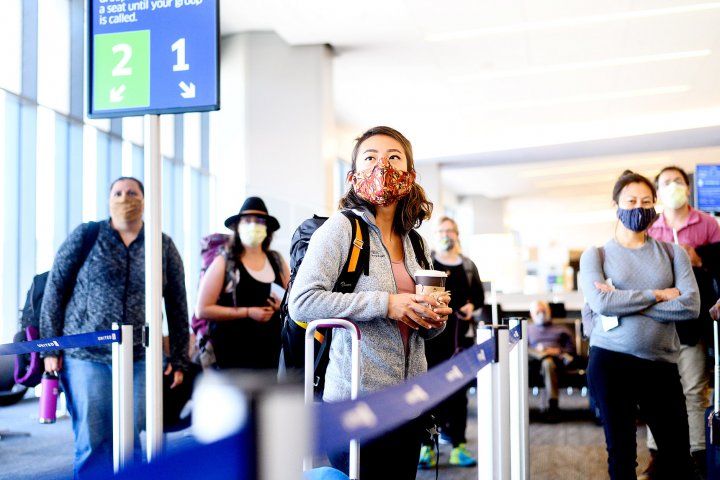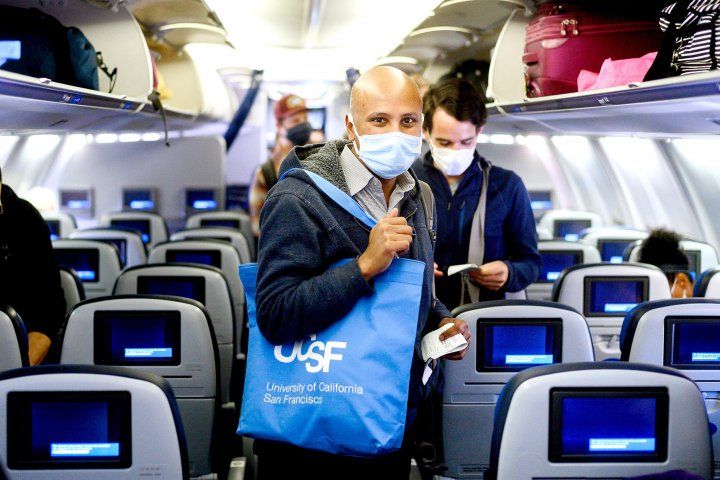UCSF Health Care Workers to Serve in Navajo Nation

UCSF nurse Jamilah Dula (center) waits to board a flight with fellow UCSF health care workers San Francisco International Airport en route to help care for COVID-19 patients in Navajo Nation. The group of staff, including 14 nurses and seven doctors, volunteered for the assignment in Navajo Nation hospitals in Arizona and New Mexico. Photo by Noah Berger
A team of UC San Francisco health care workers – seven physicians and 14 nurses – is traveling to Arizona and New Mexico on Wednesday, April 22, 2020, to begin a one month voluntary assignment providing urgently needed health care support for patients in the Navajo Nation, at the request of UCSF’s colleagues in the Navajo Nation.
Navajo Nation is the largest U.S. American Indian reservation, covering about 27,500 square miles, with a population of about 175,000. In recent weeks, it has experienced a disproportionate number of COVID-19 cases, stressing its health care system. As of April 21, 1,206 positive cases had been reported, with 48 confirmed deaths.
The UCSF health care workers who are volunteering specialize in critical care, intensive care, acute care and hospital medicine. They will be working in teams of seven in hospitals in Chinle, Ariz., and Gallup and Shiprock, N.M., three of the highest volume hospitals serving Navajo patients.
In addition to providing health care support, UCSF’s volunteers will have the opportunity to learn from their colleagues and gain experience in responding to a sustained surge from a pandemic.
The UCSF effort is being coordinated through the UCSF Department of Medicine’s HEAL (Health, Equity, Action and Leadership) Initiative, a two-year fellowship serving health care workers who are committed to working with disadvantaged rural communities around the world. The program, which includes physicians who have completed their medical residencies, as well as health care workers (physicians, nurses, respiratory therapists and pharmacists) representing the communities in need, is the largest U.S. global health fellowship – 128 people have completed or are currently participating in the program, which spans 19 sites and nine countries.
Forty-nine health care workers in Navajo Nation are current fellows or alumni of the fellowship. Twenty-five of them are Navajo themselves.
“Since 2015, HEAL has partnered with Navajo Nation to support the leadership and transformation of local leaders,” said Sriram Shamasunder, MD, associate professor of medicine at UCSF and founder of the UCSF HEAL Initiative. “COVID-19 is tearing across the fault lines of existing injustice and structural marginalization, and has hit Navajo Nation at a rate higher than 48 states. COVID-19 has shown us that we are bound together, all of us. We are grateful for the UCSF teams who chose to go to New York, and now Navajo Nation, and for all the invisible hands who helped to make solidarity happen.”

Sriram Shamasunder, MD, co-founder of the UCSF HEAL Initiative, boards a flight at San Francisco International Airport as part of a group of health care providers voluntarily providing urgently needed health care support for patients in the Navajo Nation. Photo by Noah Berger
Compared to other major metropolitan areas in the United States, San Francisco has had relatively few cases and hospitalizations. As of April 20, 2020, there were 81 hospitalized patients in the city. As of April 22, UCSF Health had 17 hospitalized patients, with an additional 20 patients awaiting results of their tests.
Providing support for Navajo Nation is another opportunity for UCSF to advance its public health mission. Earlier this month, UCSF sent 20 health care workers, who’d volunteered, to New York City, to support health care workers in the New York-Presbyterian hospital system.
“Navajo Nation has seen a marked and rapid increase in COVID-19, with more than 1,300 cases as of April 20, representing a higher per capita infection rate than most states,” said Josh Adler, MD, chief clinical officer of UCSF Health. “We remain grateful that the severity of COVID-19 in the Bay Area has not been severe thus far, enabling UCSF Health to partner with UCSF HEAL to provide support and highly trained and courageous nurses and physicians for assistance to patients and health care providers in Navajo Nation.”
The University of California, San Francisco (UCSF) is exclusively focused on the health sciences and is dedicated to promoting health worldwide through advanced biomedical research, graduate-level education in the life sciences and health professions, and excellence in patient care. UCSF Health, which serves as UCSF's primary academic medical center, includes top-ranked specialty hospitals and other clinical programs, and has affiliations throughout the Bay Area.